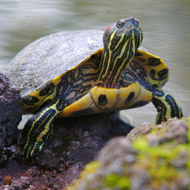RSPCA prepares for influx of terrapins

The release of the original Teenage Mutant Ninja Turtle movie in the 1990s led to a craze for buying terrapins.
The RSPCA is preparing to be inundated with terrapins as the new Teenage Mutant Ninja Turtle's film is released today.
Demand for unusual pets has always been escalated by popular films. Indeed, when the original Teenage Mutant Ninja Turtle movie was released in the 1990s, it led to a craze for buying terrapins.
Unaware that the 50p sized baby animals could grow to the size of a dinner plate, many people brought the reptiles also not knowing that they have specialist dietary and accommodation needs. As a consequence, rescue centres across the country were inundated with terrapins, and some were even found dumped in public ponds.
The RSPCA has reported that it took over 1000 calls last year relating to the reptiles.
However, it is not just terrapins that have been subject to pet crazes. After the release of Finding Nemo in 2003, pet shops and breeders reported a 60 per cent rise in the sales of clown fish.
More recently, films such as Twilight and TV series' like Game of Thrones have influenced a rise in Akitas and 'wolf type' dogs being admitted into care.
Senior scientific officer Nicola White said: “Sadly many owners who buy exotic pets on impulse after seeing a film or TV show don’t find out how to care for the animals first. When they then realise how much space and care the animal requires they can lose interest, or feel unable to care for them anymore. As a result exotic pets are often abandoned, given up to animal rescue centres or released into the wild.
“Many people bought turtles in the late 80s when Teenage Mutant Ninja Turtles were popular, which led to a large number of unwanted terrapins being abandoned when they grew too large or were more difficult to look after than expected. We are bracing ourselves for a similar trend once again.
“Terrapins are complicated animals to care for and can also carry bacteria such as Salmonella. We would discourage anyone from buying any pet on a whim and strongly urge people to think carefully first before buying an exotic pet.”
"Releasing unwanted exotic pets into the wild is cruel and illegal. Most exotic pets are unlikely to be able to survive in the wild in Britain and non-native species could pose a serious threat to our native wildlife. It is illegal under the Wildlife and Countryside Act 1981 (as amended) to release, or to allow to escape, any species that are not normally native to the UK."



 The latest
The latest